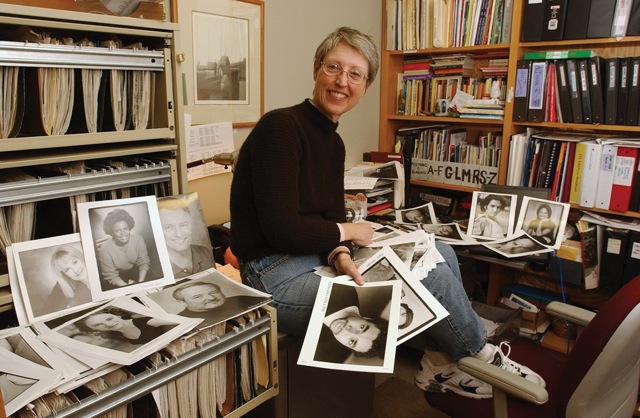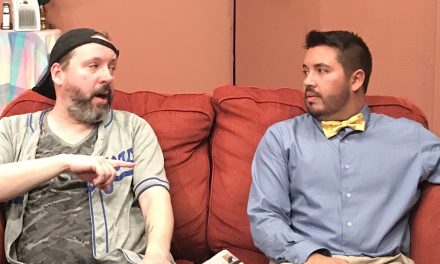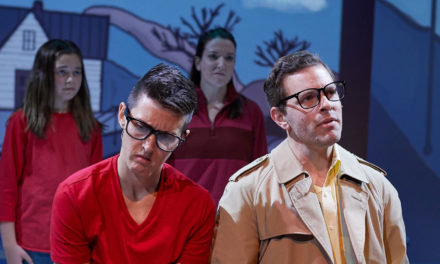Zan Sawyer-Dailey.
Photo by Pam Spaulding, The-Courier-Journal
Zan Sawyer Dailey Bids Farewell to Actors Theatre
Interview by Scott Dowd.
Entire contents ©Fearless Designs, Inc. All rights reserved.
This is a year of transitions at Actors Theatre of Louisville as the theatre celebrates forty years of commissioning and staging new American works under the aegis of the Humana Foundation. The Board of Directors will be searching for a successor to carry on the work of managing director Jennifer Bielstein; and the company must also decide how it will cope with the retirement of Zan Sawyer-Dailey who for the past three decades has provided guidance and institutional cohesion. Although not often in the limelight, her choices and opinions have strongly influenced the work of the artistic leadership and the plays they put on stage. I first met Zan twenty-five years ago through her husband, Mark, who was a member of Actors Theatre’s resident company during producing director Jon Jory’s tenure. I spoke with her recently about her time at Actors Theatre, the upcoming Humana Festival of New American Plays and why she has chosen to retire.
Zan Sawyer-Dailey: Mark is sort of semiretired, though he says he doesn’t know if he is semi-retired or just unemployed! This week he has actually been working on a feature film being shot out in LaGrange, and he has a standing gig portraying Sir Topham Hatt from Mattel’s Thomas the Train franchise.
Scott Dowd: How did he land that?
ZSD: Mark just looks like the cartoon character! They have sent him around to train shows and toy conventions for the past several years. It keeps him busy and off the streets, but it is a little bit hard on him that I still work and travel so much.
SD: How are your children?
ZSD: That’s another thing. Our daughter, who lives just two doors down from us, has two little ones. She is the legislative aide to District 10 in Crescent Hill, and I love it when I can lend some assistance with the kids. So I’m looking forward to that, plus I thought this was an opportune time for me to sneak out.
SD: You have been at Actors Theatre more than three decades now and you have worn so many hats!
ZSD: My official title is associate director but I was first hired in 1985 as the assistant to producing director, Jon Jory. Maybe three or four years into that, Jon said to me, “This title doesn’t fit all that you do.” So we came up with the title of artistic manager. That seemed in keeping with the structure as it was at that time. I continued under that banner until Jon left. A year into Masterson’s tenure, he came up with the title of associate director.
SD: What are your main responsibilities?
ZSD: In large part—just because of my longevity, I guess—I kept inheriting areas of responsibility. As people came and went, they left a little bit of themselves behind and those bits needed to be managed. I have always been responsible to the artistic director and eventually to an associate artistic director for assessing and coordinating all of the artistic staffing needs. Initially, with Jon, I was helping him to coordinate casting. Then Jon started sending me as the liaison to all the casting sessions. He had me sit with the directors of the various productions and report back to him if I saw things I thought weren’t going very well.
SD: That’s a lot of responsibility. At what point did he step in?
ZSD: Jon always came for callbacks. He was always very in tune with the process. If I called and told him I had a concern or that he needed to talk to the director about something specific, he was spot-on. He was almost always in the room for the final call-back.
SD: What about Marc Masterson?
ZSD: Marc generally came for final callbacks. I think he felt secure enough in my experience and knowledge of his tastes and interests in terms of actors that I would make the appropriate decisions.
SD: And now, of course, you are working with current Artistic Director Les Waters.
ZSD: Les doesn’t always come in for final callbacks. We don’t ever make an offer to an actor or to any artist that he hasn’t approved. But nowadays, because of Google, it’s pretty easy for me to send him a list of the actors we’re interested in and let him look online at what they have done. Then we talk about their strengths and why the director is interested in them. He will then sign off, or he won’t. Sometimes he’ll say, “I’m not particularly interested in that person—let’s keep looking.” Working carefully with any of the artistic directors in hiring any of our artists has always been a part of what I do.
SD: What are some of your other areas of responsibility?
ZSD: I also help the directors think through their needs for things like dialect coaches, a fight choreographer, music director…those kinds of things. Then I help to identify that person and go through the process of getting them contracted. Those negotiations are a large part of what my office does.
SD: I also happen to know that all three of the artistic directors have looked to you for input on shaping the season.
ZSD: Over the years I have become one of the collaborators. I do participate in season selection—although ultimately that is the decision of Les along with Meredith McDonough, Associate Artistic Director. I also participate in some of the marketing plans and I mentor and supervise our company management department.
SD: What does that entail?
ZSD: Company management is a very complicated department and we have the best company manager in the country. Dot King is simply the best, no kidding, and our guest artists are very lucky to have her. I give her the information about who is going to be coming in and she coordinates travel and housing for all of them. During their time here, she will also make sure they stay healthy and address any personal needs they may have, such as going to the doctor and the grocery.
SD: That is a huge job.
ZSD: It is a huge job and she’s fabulous. I also work closely with the education department, making sure they are able to do what they set out to do. Education has grown meteorically since its inception. Marc Masterson was the one who first instituted an education department, and we spent a couple of years trying to figure out what it actually did. With strong leadership, we have built that program into a huge part of our operation. They do residencies in all of the Jefferson County public and private schools, as well as across the river and in surrounding counties.
SD: Actors Theatre has always been known for its innovations, and that is true of the education department as well.
ZSD: Yes, it is. In addition to teaching playwriting, they do what is called “The Living Newspaper.” They take what is in the headlines that day and turn it into plays. The educators are also in charge of preparing students coming to see the matinees. It’s a really important part of our overall mission of enrichment to the community.
SD: I think that is true of arts organizations across the spectrum. Twenty-five years ago education was almost an afterthought. Now it has become almost as important as the main stage productions for some groups in terms of both community outreach and fundraising.
ZSD: Well, among other things, we are training our next generation of patrons and leadership. Cultural organizations have a profound impact on future citizens, and civic leaders recognize that. Of course, we are very blessed in this community to have such a strong resource in the Fund for the Arts. The work they do to get us out into the schools and community is so important.
SD: It’s difficult to think about Actors Theatre without you. You have worked closely with the company’s three artistic directors. What do you see as the most significant changes that have occurred?
ZSD: Obviously, each of them has had their own particular taste, style of management and set of goals. Jon was one of the front-runners of regional resident theatres. He’s very fond, in his storytelling, of talking about how nobody knew how to do this. There were no rules because it had never been done before. They discovered the need for contributed income to supplement ticket and merchandise sales. They realized that for the theatre to grow and survive, it was going to have to do more than put great plays on the stage. They developed their skills as grant writers and fund raisers. They went out to find sponsors. They built a subscription audience once they figured out what it needed to be and why they needed it. One of the things Jon taught me—and all of us—was that style of hardscrabble management. He went out and got things done. It was a much smaller organization then, of course. When I came here in 1985, we had some huge successes with Humana Festival productions moving on to New York—some of those plays like The Gin Game had gone on to win Pulitzer Prizes. But it was still something of a “mom ’n’ pop” operation. I remember when the parking garage was an empty lot and we used to park across the street where the LG&E building is now. As the organization expanded, it grew into the institution it has become. Part of my time here has been spent watching and learning and adjusting to that larger institutional thinking and those larger institutional protocols. It was quite a change when we actually had to write down policies. Then there was, of course, the advent of the internet, which changed everything.
SD: People born in or after the 1990s don’t really understand what an enormous change that was.
ZSD: It was a huge change! I’m still a computer dinosaur. Luckily, I have people around me who can help. So much of the work we do now is more streamlined. When I first started going to New York looking for actors, directors or designers, I was relying heavily on “set-ups” and scripts. A lot of it was word-of-mouth. The internet has expedited things and allowed us to reach a much broader market.
SD: It was difficult for a lot of us on the outside of the organization to see Jon Jory leave. He was so integral to Actors Theatre that it was hard to imagine it continuing without him. What was it like for you?
ZSD: What strikes me about that time is how successfully Marc managed the transition. He took his time and always recognized the legacy he had inherited, while at the same time moving forward to make this his own organization. He eagerly pursued new theatre technology and innovative programming.
SD: Les Waters came in one artistic director removed from Jon’s legacy, which puts him in a very different position to effect change.
ZSD: One of the things I have really enjoyed about Les’s leadership is that he came in prepared to get Actors Theatre’s name into the national arena again.
SD: How has he gone about that?
ZSD: He’s done it by himself by directing several plays in New York and in Los Angeles, and by getting previous Humana Festival productions like The Christians and The Glory of the World to New York and Los Angeles. It has been a real goal for the board to restore that national reputation.
SD: Why had Actors’ reputation receded?
ZSD: We did have to cut back our programming pretty severely when the deep recession hit everybody.
SD: That was just about the time Actors Theatre made another important transition in the business office.
ZSD: Yes, the transition between Sandy Speer and Jennifer Bielstein was also extremely well-managed. I have such supreme admiration for her work as managing director. She puts Actors Theatre at the forefront locally and nationally by being constantly out in the community.
SD: Surely you are staying through the Humana Festival.
ZSD: Yes. I am going to stay through the end of the season. Our fiscal year ends May 31, so it made sense to stay until then.
SD: Do you have any thoughts about what you might do after June 1 aside from helping with the grandkids?
ZSD: A long time ago, I began teaching acting classes for adult students. At the time there was no one I could identify who was doing that. There were a lot of opportunities for young actors, but nothing for adults who wanted to find out more about acting. I have also been teaching as an adjunct at the University of Louisville since I started here. I am hoping to continue to do that as well as my adult teaching.
SD: The Humana Festival opened at the beginning of this month. What are some of the plays you are looking forward to?
ZSD: I really believe it’s just a fantastic lineup of talent and work. Les is directing a play by Sarah Ruhl titled For Peter Pan on her 70th birthday. I’m really excited about that commission and about having Sarah here. Because it’s Les, because it’s Sarah, because it’s a wonderful play, it has a stellar cast. It will be a lot of fun to see these people who are older than you and me flying up in the air. There are a couple of surprises in that production that I’m not going to tell you about, but audiences who see it will be amazed. I also think the production that will be in the Victor Jory Theatre, Cardboard Piano by Hansol Jung, is a beautiful, difficult story about what happens in times of war and how it tears apart families and loved ones. It looks at how we find forgiveness. It is set in Uganda during the civil war there. This is a very special play. But I truly love the whole lineup. You need to see them all to understand the depth and breadth of the Festival. The play we are doing with the acting apprentices called Wondrous Strange is going to be exciting. The original impetus was to commission writers—Martyna Majok, Meg Miroshnik, Jiehae Park and Jen Silverman—to explore stories of hauntings in Kentucky. That idea kind of expanded outward, but it is still about ghosts. It has a folksiness to it and, of course, some great writing. I have been proud to be a part of the last three decades of life at Actors Theatre of Louisville. Over the years, the Humana Festival of New American Plays has become an increasingly important part of my life internally as well as an increasingly important part of the global theatre landscape. We have had some great years…and I think this one is no exception!
For more information about Actors Theatre of Louisville and to purchase tickets for this year’s Humana Festival of New American Plays that is running through April 10, go to actorstheatre.org or call the box office at 502.584.1205.
Scott Dowd has a wealth of experience working within and commenting upon the arts scene in Louisville. He has been involved with Kentucky Opera, the Louisville Orchestra, and Louisville Public Media. His talents and experience include: Actor; Director; Singer; Musician; Radio and Television Interviewer; Classical and News Jock; Public Speaking; Public Relations; Marketing; Development; Writer; Substantive Editor. He currently serves on the Board for Arts-Louisville.com.





